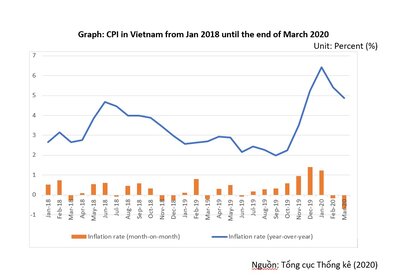Dont let economic stability be a pay off in social distancing

FNF Vietnam - Bui Ha Linh
On March 31, 2020, the Prime Minister of Vietnam issued Directive No. 16/CT-TTg, which mandates strict social distancing throughout the country for 15 days, only factories, production facilities and business related to essential goods and services are allowed to open.
First of all, it is necessary to reaffirm that public health is at the forefront at this time. Like many countries such as the United States, the United Kingdom, Germany, Iran, etc. social distancing or lockdown is essential and urgent to preserve human resources. However, how long mankind has to fight against Covid is not known yet, so social distancing needs to implemented at a certain time and in parallel with a series of appropriate economic policies so that the economy is not a trade-off for health, and that the nation always maintains essential economic resources to fight the pandemic. That will be the key points in our discussion today.
Signs of recession are warning us about not-so-bright future
Currently, some signs of recession have appeared over the world. According to Standard & Poor's forecast, global growth will drop to only 0.4% this year, the lowest level ever in nearly four decades. The US economy is absolutely on the verge of recession: unemployment reached 3.2 million people which is five times higher than the record number in October 1982, economic growth rate is forecasted to decrease by 2% according to Moody or 3.8% according to Goldman Sachs. The European economy, in general, will also witness a deceleration; Germany, in particular, reckoned to decline by 7.2 – 11.2% or even more according to a German Think Tank named CESifo.
In Vietnam, although growth in the first quarter of 2020 was the brightest in the region at 3.82%, some signs of instability appeared. In particular, export and import growth dropped sharply compared to the same period in 2019; the trade surplus from both FDI and domestic sectors was the lowest in the past 2 years; and the stock market fluctuated unexpectedly, foreign net sell consecutively.
Social distancing is necessary but the optimal duration of the Directive should be considered
Social distancing in the major cities of an economy such as New York, Berlin or Hanoi, and Ho Chi Minh City is sanding the economic wheel and probably freezeing a number of commercial and production activities. Human interaction is the driving force that pushes the flows of goods, services and capital. Although digital platforms plays a significant role on encouraging the free movement of goods, human is still the main and irreplaceable entity in the service sector. It has been almost a week since Hanoi and Ho Chi Minh City officially shut down part of businesses, and it will be another 15 days until the request for social distancing ends. For an economy containing up to 5 million business households (according to the General Statistics Office) which account for roughly 30% of the GDP, the shutdown in at least three weeks leaves a severe effect on individuals. This is because no opening means no profits, no buying intermediate products and no supporting items as well. Most production chains are on the edge of breaking. The limited national supports by cash or interest-free loans only ensure that households can survive at the most basic level in a few months, not strengthen them to fight instability in Covid-19 pandemic or at least getting small savings for worse scenarios. So handing out free cash while requiring shutdown as the way US did is just a temporary solution at this time to ease the severe shocks of Covid-19 but should not a wise choice for long term.
So what should government do in long term? The right thing politicians should seriously consider is to maintain the regular trade and free capital movement while grouping and quarantining a number of people with Covid-19, which means that operating an economy and health care system need to be done at the same time. Economic growth will be a buffer to facilitate good health care services, otherwise all national budget might be burned subsiding and paying long bills for ventilators.
If Covid 19 is to be fought extendedly, we seem to have no choice but to accept the participation of all economic entities, especially 5 million business household to join our battle, their shutdown will cost us a huge loss in long term. So, turning back to the solutions now, governments should take more actions rather than just giving out cash of around 1 million VND per person to maintain citizen’s survival. Regarding goods and services, despite ensuring food security in domestic markets, policy makers should encourage the export of agricultural and aquatic products such as vegetables, coffee, pepper, etc., which underwent an increase in output in the last three months, especially when some competitors from Brazil, China are having problems due to the Covid-19 pandemic. This is a way to directly support farmers, the most vulnerable group during a pandemic, to manage their living expenses. In the capital market, the current credit support packages are prudent, but most are directed towards SMEs or larger scale businesses. The economy needs another credit package aiming at household businesses. Since letting household businesses borrow is a risky option, the credit should come with requirements on formalizing business activities. This is an opportunity to encourage 3.4 million unregistered household business to formalize their economic activities to be subsided through difficulties.
Controlling inflation is an ultimately important goal at this time
Similar to other countries, a series of support packages have been launched by the government, such as the VND 250 trillion credit support package, the VND 30 trillion fiscal package for businesses and more than VND 61.5 trillion for vulnerable citizens  due to Covid-19 on 1st April. However, for maintaining stable lives in the pandemic and more making effective support packages, inflation needs to be curbed at a low level for at least the next three months. Assuming that inflation increases, the nation's support packages immediately decrease in real value because people will have to pay more to get by and businesses will suffer from higher costs while the operations stop.
In Quarter 1/2020, the average CPI increased by 5.56% compared to the same period last year, of which some essential commodities sharply went up such as food that increased by 13.21%, meat by 58.81%, vegetables by 4.14%, prices of medical drugs, electricity and water by 1.43%, 9.89% and 4.75% respectively. If the situation continues, all efforts to maintain the welfare of the people will be in vain.

Social distancing, despite being an obstacle for goods transport, the current situation is still favorable to curb inflation when world gasoline and oil prices are low, and the state holds the power in pricing electric. What needs to be done now is to ensure the stable supply of foods. The government can encourage foreign sellers to enter the market to bring the current price of basic supplies down, for example, meat price. Secondly, the local authorities should be required to create favorable conditions for transporting goods and supporting the logistic industry to lower shipping fee.
Reaffirming that social distancing in pandemic is essential, still the government needs to carry it out in tandem with a number of appropriate policies to ensure the economy was not traded off for health goals. Encouraging free trade and promoting the flow of goods that move inside and beyond borders are essential now to maintaining the survival of production chains and to keeping the economy from falling off. That is also what the Friedrich Naumann Foundation in Vietnam along with our partners always aim at, regardless of any circumstances.
*(Graph) Source : GSO Vietnam (2020)
- Ha Linh -